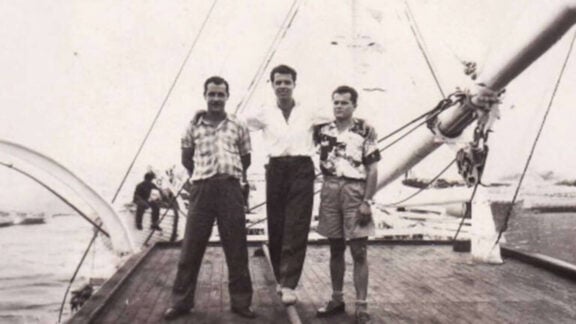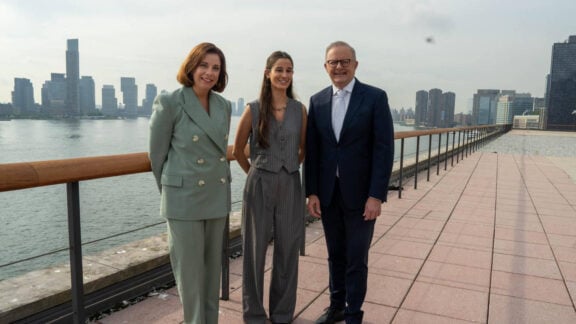The 140th anniversary of the birth of Nikos Kazantzakis was marked at an event at the University of NSW, which included a documentary about his works and a panel discussion on the life and contribution of the prolific writer.
The initiative was held on Wednesday and featured a screening of Menios Karagiannis’ 2016 documentary “33.333: The Odyssey of Nikos Kazantzakis”, which examines the Greek poet and his works, most notably his mission in creating his own version of “The Odyssey”.
The film was followed by a panel discussion of three well-known academics of Greek Studies at tertiary level that went into even greater depth on the Greek author.
The event was organised by the School of Humanities and Languages of UNSW in collaboration with the Foundation for Greek Studies of UNSW, the Hellenic Society of UNSW and the Sydney Branch of the International Society of Friends of Nikos Kazantzakis.
Ioannis Mallikourtis, the Consul General of Greece in Sydney, addressed the audience prior to the screening with a message of support for these types of initiatives, particularly given Modern Greek at tertiary level is once more under threat.
“At a time when the importance of teaching the Greek language in our universities here in NSW is questioned by some, events such as today’s provide a convincing answer,” Mr Mallikourtis said in his speech.
“Greek letters and culture have a lot to offer to younger generations and the work of Nikos Kazantzakis is perhaps the most characteristic example of the richness of our culture.”
Following the film there was a panel discussion featuring Dr Alfred Vincent, who taught Modern Greek studies for 25 years at the University of Sydney, Dr Maria Zarimis and Dr Vassilis Adrahtas, former and current Heads of the Greek Studies Program at UNSW respectively.
Dr Vincent, who has also been a travelling professor at the University of Crete, mentioned that Kazantzakis regarded himself primarily as a poet, using verse (poetry) as his means of communication.

He also shed light on the Greek writer’s motivations behind the language he utilised in his version of “The Odyssey”.
“Kazantzakis tried to make ‘The Odyssey’ a kind of museum of the Greek language, bringing into it words from all areas of Greece,” the noted academic said.
“This does not necessarily make it very easy reading, especially as nowadays much of that village language, rural language has gone out of everyday use.”
Dr Zarimis, a biomedical scientist, elaborated on Kazantzakis’ writings that particularly concerned his insights in philosophy and cosmology, noting his fascination with Charles Darwin’s book “On the Origin of Species” which the Greek writer translated into Greek in 1915.
She also mentioned his correspondence with acclaimed physicist Albert Einsten in the 1950s, while emphasising one of her favourite works of his, the philosophical essay “Askitiki”: The Saviors of God, wherein he asks cosmological questions like ‘Why are we here?’ and ‘What is the meaning of life?’.

“Kazantzakis was well aware and informed of all that was happening at that time in terms of cosmology and physics in tandem with religion, and he utilised the concepts to write in his notebooks, letters and his essays,” she said.
“He was no longer religious in the traditional sense. His quest in life now became philosophical or spiritual, one for perfection and cosmological enlightenment.”
Dr Adrahtas built on this point with his own thoughts on Kazantzakis, whom he mentioned has been described as a non-conventional theist, an atheist and an anti-religious person.
“It’s very difficult to pinpoint down what exactly he is in terms of religion, theology or the spiritual in general because he doesn’t want to be pinpointed down in the first place. He does not want to be categorised,” the current Head of the Greek Studies Program at UNSW said.
“Personally, I think he is a milestone for anything that has to do with theological letters. I don’t think there is any other writer in Modern Greek literature that confronts the God symbol as much as he does in his work.”
Dr Adrahtas also shed light on Kazantzakis’ nihilistic qualities, who shared the opinion that nothing comes before birth or after death.
“Because of that, he espouses a very charismatic activity so if your frame is nothingness, try to make out of it as much of it as you can and as big as you can.”








